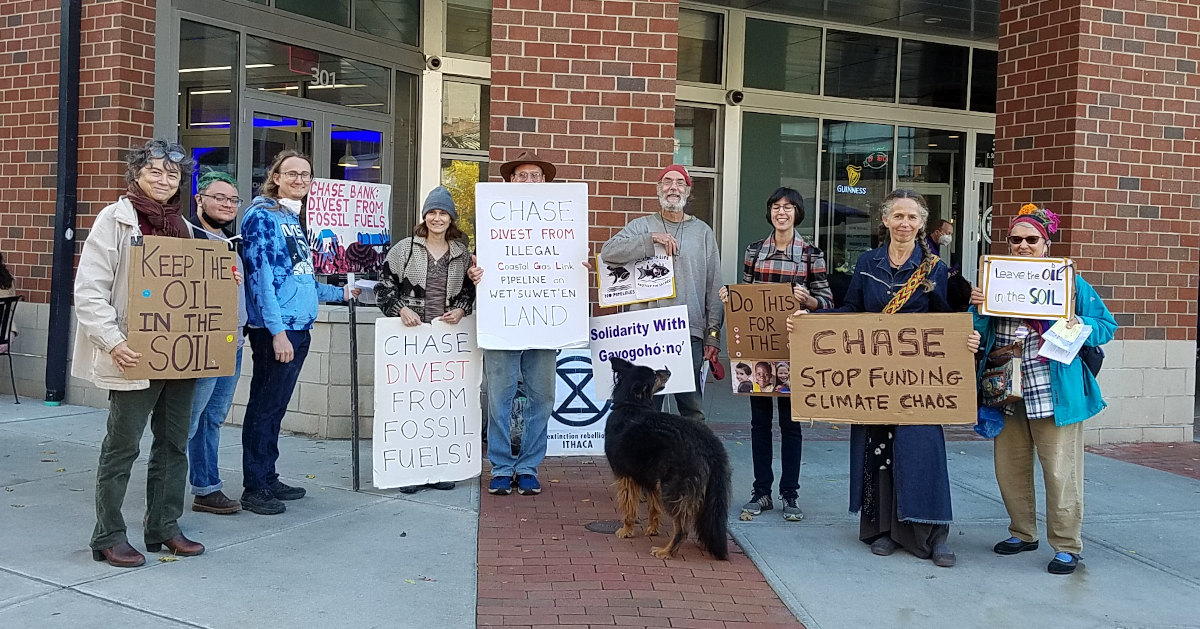Climate change is widely considered one of the greatest challenges of our time. The result of excessive burning of fossil fuels and environmental destruction, it has already had devastating effects in the form of heat waves, flooding, wildfires and more. While many in Ithaca and around the world are starting to move away from fossil fuels, big banks like Chase continue to invest heavily in fossil fuel companies. In response, local Extinction Rebellion (XR) activists are pushing for Chase to divest from fossil fuels—and, in the meantime, for consumers to invest their money in more climate-friendly banking options.
Since 2016, Chase Bank has contributed more than any other bank worldwide to fossil fuel companies and developments, a total of 434.1 billion dollars as of 2022. Citibank, Wells Fargo, and Bank of America are the next largest fossil fuel investors—all of which, notably, are American. A tool created by Bank FWD, the Outdoor Policy Outfit and Green Portfolio, estimates that every 10,000 dollars in a Chase bank account corresponds to an additional 1.3 metric tons of CO2 emissions per year. While many banks invest some amount in fossil fuels, accounts in local or regional banks and credit unions correspond to smaller greenhouse gas emissions and are considered more climate-friendly. According to Sheila Dean, a member of XR Ithaca and Third Act, without funding from Chase or other large banks, “in many cases, these big [fossil fuel] development projects couldn’t have happened.”
XR Ithaca is a local chapter of Extinction Rebellion, an international non-partisan organization that uses direct action and civil disobedience to push for climate action. It had a few larger rallies and actions at Chase’s local storefront before the pandemic, and participated in a national day of action in March of this year against so-called “dirty banks.” Members have also tabled at events such as Applefest to raise awareness about the issue. Most remarkably, activists from XR Ithaca and other community members have been rallying outside of Ithaca’s Chase Bank every Saturday morning since January 2022 in so-called “climate vigils.” With regards to the weekly vigils, Dean mentioned to The Tattler that, “One very positive thing about this is our persistence.” At the vigils, activists hold up signs and talk to passersby about Chase’s fossil fuel investments, encouraging those with bank accounts at Chase to move to another, more climate-friendly bank instead.
XR Ithaca is only one of many organizations around the world that is pushing back on a local level against bank investments in fossil fuels. Although Chase continues to invest in fossil fuel companies, as this continues to be profitable, XR Ithaca has been working hard to spread awareness about this issue and has managed to convince some former Chase customers to switch to different banks. Bethany Mays, an Ithaca resident, told The Tattler, “XR activists made me aware of the problem of ‘Bad Banks’ funding climate chaos. Their activism made it possible for my family to cut our ties to these banks and reinvest our personal accounts into the local community through Alternatives Federal Credit Union. This is a doable, meaningful action for individuals to take. That data suggests that it has a ripple effect, and that divestment on all levels, from individual to institutional, is exerting change.”

